This story was originally published by Sahan Journal. Sign up for Sahan's newsletter for more stories.
By: Becky Z. Dernbach, Sahan Journal
Yosi’s first day of school in the United States felt like every American movie she’d ever seen.
Yellow school buses lined up outside the building. The hallways swarmed with students. And the school had a large gym, just as she’d seen in films. She was a long way from her village in Mexico, where her school had just three classrooms with a library, a laboratory and a computer room.
She had arrived in Minneapolis just two months before, reuniting with her parents after a years-long separation. Now, she had to find her way to class in a new school in a new country where she did not speak the language.
In the second half of the Biden administration, half a million new immigrant kids arrived in U.S. public schools. Minneapolis Public Schools, reeling from years of enrollment decline and corresponding budget cuts, welcomed the newcomers. More than 2,500 new students whose first language is Spanish enrolled in the district between January 2023 and January 2024, according to district data.
Andersen United Middle School became a haven for these newcomers. As of September 2024, about a third of the school’s 1,000 students were recent arrivals who had been in the U.S. for three years or less.
The school offers a dual-language Spanish program, as well as mainstream English classes, which meant many of the new Spanish-speaking students were able to take classes in their native language. But coursework wasn’t the only challenge they faced. To help make the transition more seamless, the school added classes to help orient students new to the country to the quirks of the American education system.
Every new student had a different journey. Thirteen-year-old Santiago started at Andersen in the spring, shortly after completing a perilous journey from Ecuador with his father. When he first arrived, Santiago slept a lot, depressed. He asked his father why they had left Ecuador. He kept thinking about everything he had seen on his journey. “I couldn’t rest because I was sleeping and dreaming about what was happening before,” he said.
But when he started at Andersen, he made friends quickly and became more himself again. Before long, he was asking his dad to take him to explore his new city.
On her first day of school, Yosi, 13, saw that some of her classmates seemed to already know each other from the previous year. She felt jumpy, trying to understand where to go. Then a classmate approached her and asked to see her schedule. Yosi showed her, and the classmate helped her find her classes.
Sahan Journal is identifying Yosi, Santiago, and other immigrants in this story by their first names, nicknames or familial ties, due to their immigration status.
Yosi knew there were people in the United States who did not want her there. Donald Trump had promised voters mass deportations if he returned to the White House. But she also understood that some people, like her classmate and her teachers, wanted to help her.
On that September day, the presidential election still seemed far away. But the question loomed in the background: after all they had been through to get to America, would these middle-schoolers be able to stay?

A ‘home base’
Kids who are new to the country have a lot to learn about how American middle school works: the grading system, the computer portal and what kinds of behaviors might get you in trouble.
That’s where Annie Connor comes in. She was previously Andersen’s lead ESL teacher, supporting and coaching other teachers. Now, her focus is on supporting students new to the country, including classes dedicated to orienting them. Yosi and Santiago attended her third-hour class.
“You all receive an F on your test!” Connor teased them one September day. Their assignment, projected on the smartboard, had been to ask a classmate their favorite animal.
Each of these students is the new kid in school, in a sea of new faces navigating a new country. Connor gives them time to get to know each other, before plunging into a lesson on navigating the school’s system for marking attendance and tardies.
Before this class existed, Connor recalled playing “whack-a-mole” with newcomers’ needs, addressing questions after a problem arose, rather than proactively teaching them in advance. And she helps them understand confusing things about their new country, from holidays to winter clothing to a crash course in American history.
Her classroom has become a “home base” for newcomers who are dealing with not only the regular mental health and social struggles of middle school but also the challenges of moving to a new country and the trauma of an immigration journey.

‘Leave your past behind’
For Yosi, arriving in Minnesota meant reuniting with her family. Her father had come to the U.S. six years before. Her mom had joined him two years ago, and had since given birth to Yosi’s baby brother. Her older brother had made the journey before her, too. Until now, Yosi had stayed behind with her grandmother.
“In Mexico I was practically alone,” she said.
Knowing the danger of the journey, her parents sent for her in the safest way they could: She flew to the border with a neighbor and they crossed together. She learned the night before that she would be leaving, and was only able to say goodbye to a few people in the village where she had been so close with so many people her whole life.
“It feels awful to see your town for the last time and know you’re never coming back,” Yosi said. “You just have to be strong and get out and leave your past behind.”
Yosi spent her first week after crossing the border at a teen shelter in Arizona. After immigration authorities confirmed that she was her father’s daughter, she flew to Minnesota. She was too excited to sleep on the plane. When she landed, she almost didn’t recognize her father at the airport. They embraced.
That day, she met her baby brother for the first time. The family celebrated Yosi’s birthday by taking her to see the Spoonbridge and Cherry at the Walker Art Center Sculpture Garden, a Minneapolis landmark, ordering Yosi’s favorite seafood, and getting Michoacana ice cream.
Through the summer, she went fishing and joined her family playing soccer on weekends. She began to spend time with other family members who had come to Minneapolis, too.
She was close with a cousin who worked in roofing — a sometimes dangerous job that employs many men who don’t have work visas, including her dad and older brother. He hung out with her family every weekend. She describes him as a good person who came to the United States to help his parents back in Mexico.
But one day she returned home from school to hear that her cousin had fallen off a roof and was in the hospital with life-threatening injuries.
Yosi was shocked. They had spent the afternoon together the day before.
“There were many days waiting for the doctors to give us a little bit of hope, although it was minimal,” she said.
Records show that Yosi’s cousin fell to the ground after part of a roofing structure collapsed. He sustained severe head trauma, and died from his injuries three days later. A Minnesota OSHA investigation later determined the company had not had adequate safeguards in place to protect its workers from falls.
Her cousin was able to donate six organs, before the family flew his body back to Mexico so his parents could see him one last time.
After the accident, Yosi told her dad she worried about his dangerous work. But he waved her off.
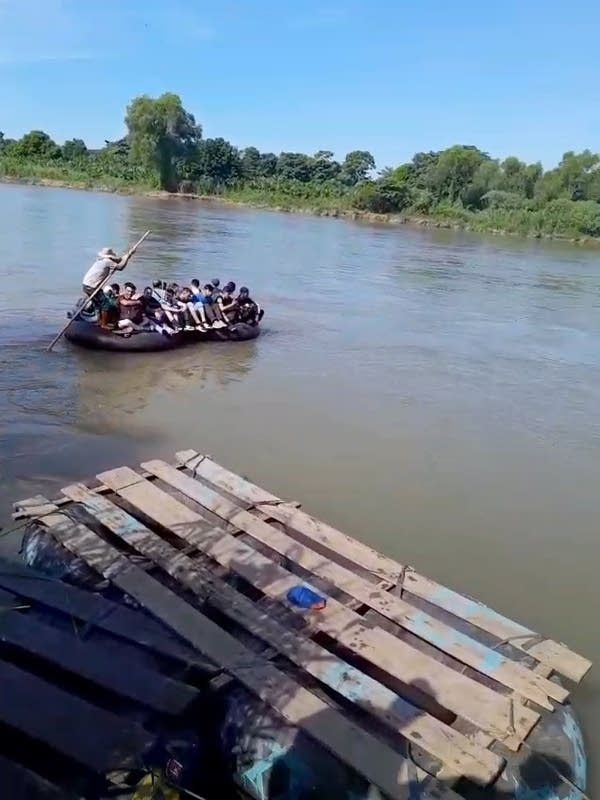
He’d tried painting and landscaping work. But he liked the hard physical labor of roofing. And he earned a good wage. He took safety precautions, like tying himself well and leaving his phone in his car to avoid distractions.
In six years on the job, he said, he was aware of one fall besides his cousin’s — a young man who was unharmed, just scared.
“It’s dangerous, but I like it,” he said.
‘My biggest fear’
Santiago’s father didn’t think that they would make it to America.
He knew the journey was dangerous. He chose to leave his daughters behind with their grandmother due to safety concerns.
But for his son, he decided the risk was necessary. After Santiago started school in the fall, nearby gangs started making threats, indicating they wanted to recruit kids his age.
There was too much danger for Santiago in Ecuador. And Santiago’s father had lost his job. He’d worked as a driver, delivering Toyota and Chevrolet cars to dealerships in different cities. But some of his colleagues had been robbed and kidnapped. Cars started disappearing. So the owner decided to close the business; it wasn’t profitable anymore.
Without a job, Santiago’s father was less able to provide for his family. He worried that that might make his son more vulnerable to falling in with gangs.
“That was my biggest fear,” he said. “Well, it still is.”
So he decided to leave with Santiago.
Santiago, who liked playing soccer and painting at school, had never thought he might immigrate to America. But he liked the idea when his dad told him they were going.
“I thought it was nice because here you can fulfill a dream you have,” he said. He’d like to join the Navy, he said, or become an FBI agent. “But at the same time, it’s worrying, because you don’t know what might happen to you on the journey, or what situations or dangers might arise.”
They left in October 2023. They did not know it would take them six months to reach America.
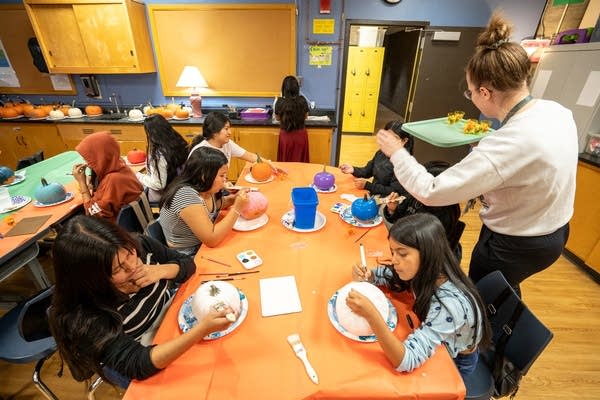
Painting pumpkins
In October, Connor’s students started their first project: painting pumpkins and delivering them to their teachers with a note of gratitude.
It’s a way to introduce students to the American version of Halloween, encourage their creativity — and help them to dig deep into what they appreciate about the adults in their school.
Yosi made a pumpkin pirate, which she planned to give to Connor. Santiago painted his pumpkin black with a white jack-o’-lantern face. He wrote his card to a behavior dean, thanking her for taking his phone away twice. Because of her, he no longer brings it to school, he wrote.
For Connor, the activity had many purposes: allowing students to express themselves without language; using the brainstorming process; developing an idea, executing it, and troubleshooting any difficulties along the way. And it’s an opportunity for them to learn about an American holiday, and try candy corn and apple cider for the first time.
But in the end, she said, it came back to the idea of community — and helping the students establish a firmer home base. “Because your community has now changed,” she said.
‘There’s no strength to help anyone else’
Santiago and his father left Ecuador on a bus. First, they crossed into Colombia. Then, they had to make the trek by foot through the Darien Gap.
Santiago’s father had hoped to protect his son from hardship on the journey. But he couldn’t hide the brutal realities of the route through the jungle.
“Many people injured, many dead bodies, people who were going in the river and drowned,” Santiago’s father said. “And you have to see that every day while you’re in the jungle.”
He recalled seeing a woman with three children had broken her leg and couldn’t move forward. Santiago and his father were unable to help her; they didn’t have food and needed to keep moving.
“It’s heartbreaking to see how they ask for help and not be able to help,” Santiago’s father said. “I mean, there’s every intention, but you can’t help. You can’t carry another burden because you’ll just barely get out yourself. There’s no strength to help anyone else.”
As he kept moving forward, he tried to put Santiago at ease. But the images of the dead bodies in the jungle seared into Santiago’s mind.
They emerged into Panama, and after sending home for money, made it through Panama, Costa Rica and Nicaragua.
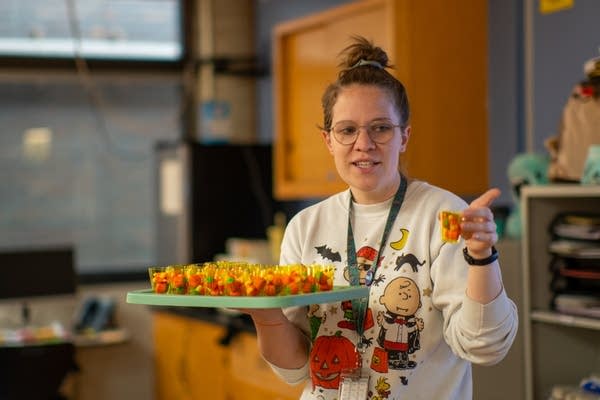
Losing fear
Days after the kids delivered pumpkins to their teachers, Donald Trump, who ran on a platform of mass deportations, was elected for a second term as president.
Although Connor felt worried, she kept her focus on wrapping up the first quarter. She did not want to project her adult fears onto them; she wanted to hear from students and families before deciding what to do. She addressed the election results briefly in class, assuring the kids that their voices mattered.
Around this time, Connor learned that one of her students had been deported — the first time that had happened, to her knowledge. He was from Ecuador, and had attended Andersen only for about a week. When he explained to Connor why he was leaving, he told her “the judge said the violence isn’t real.” Then he was gone.
An undercurrent of fear started to build among some students. “None of it matters, we’re all going to get deported anyway,” another of Connor’s students told her.
Connor brought her boyfriend, Manuel, to class, to help the kids dig a little deeper in their journal prompts. She had asked them to write about something they were proud of — a question many struggled to answer.
Manuel, a recent immigrant from Peru, told the students that when he arrived in the United States, his English was “zero zero zero.” He leaned on his cousin, who had been in the country longer, to communicate for him. But one day, she wasn’t around, and he was hungry. He walked through the neighborhood until he found a Subway.
“I saw through the glass that there were many people in the line ordering,” he recounted. “I didn’t want to go in, because they were all Americans, and I was afraid they would make fun of me. I felt, I don’t know English, how will I communicate?”
After the others in line left, Manuel stepped up to order a sandwich. He pulled out a translator on his phone. His first attempt to order: “Give me one sandwich.” After the look on the employee’s face, he tried again: “I want one sandwich.” He had forgotten that at Subway, you have to answer a lot of questions about which ingredients you want on your sandwich. He said yes to everything.
It marked a milestone for Manuel. “Finally, I ordered my first sandwich in the United States,” he said, laughing. But it wasn’t just about the sandwich. “I felt proud. But I felt more proud for having lost my fear.”
Connor encouraged the kids to reflect on Manuel’s story. Many of them had written they were proud of learning more English, she said. But she asked them to dig with their mental shovels: Why did that make them proud?
One girl volunteered an answer. Connor repeated it for the class.
“That you can do more things more independently.”

‘I just stay in my room with my phone’
Stuck inside in a Minnesota winter, Yosi missed the sense of freedom and community she’d enjoyed in her village in Mexico. The streets were much bigger than Yosi was used to, and there were too many cars. It didn’t feel safe to walk about on her own, the way she had in Mexico. She found that it was hard to get around Minneapolis without a car. Visiting a friend a few blocks away felt too dangerous to do on her own.
“I was free to go out there,” Yosi said. “If we wanted to go to a store, buy something. But not here. Here, I can’t go to the stores alone.”
Yosi knew she would have better opportunities in the United States than in Mexico. Many people in her village, including her dad, didn’t finish school because it was too far away, or their parents could not afford to send them anymore. Jobs were few, and the pay was low.
But she missed her way of life in Mexico, where she knew everyone and everyone knew her, where she could walk to a store, where she could easily hang out with friends, where she lived with a sense of community.
Sometimes her parents had friends over, but they didn’t have kids Yosi’s age.
“So I just stay in my room with my phone,” she said.
In Mexico, she spent a lot of time doing homework, which she enjoyed. But at Andersen, her teachers rarely assigned homework. Sometimes Yosi felt bored.
“Here I have a lot more free time, and I don’t have anyone to spend it with,” she said.
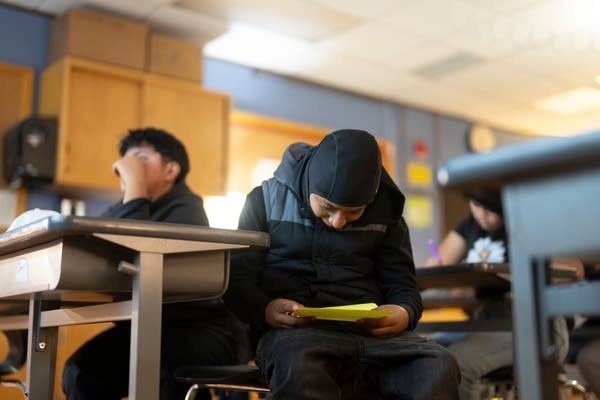
A change in behavior
In November, Connor let kids choose a Thanksgiving food to try. They voted for pumpkin pie. Connor brought some in; the students gave it mixed reviews. A new student, whom his friends called Gordito, joined the class, and sat by Santiago. Connor cautioned her students about winter and taught them how to walk on icy sidewalks.
“You’re a penguin who wants to fly, but knows that he can’t fly,” Connor joked, as one student demonstrated. But she praised his attempt. “You didn’t raise your foot much. You were just scratching the ground with your foot. That’s good, seriously,” she said.
As winter set in, Connor kept kids after class in small groups to distribute donated and thrifted coats and boots.
One December day, Santiago skulked into Connor’s class and sat in the red rocking chair in the back of class, rather than his assigned seat.
Connor decided to allow it. Santiago had been getting in trouble and skipping class; she’d just had a tough family meeting with his parents.
And Connor noticed some troubling social patterns. Kids were forming groups with names and rivalries. Santiago and Gordito sometimes waited at the top of the stairs for kids they didn’t like. There had been a few fights, including one where a student was pushed. Santiago wasn’t the instigator, but he was often on the periphery. She held Santiago and Gordito after class one day for an intervention.
“What always makes me nervous, whether it’s gang-related or girl drama or a conflict that snowballs into something bigger, is this loss of individual identity,” Connor said later. It made her worry they would blindly follow whoever was perceived as the leader. She knew there were few spaces where they felt a sense of belonging, and they were trying to create their own.
Santiago did not see Connor’s concerns. He was just hanging out with friends, and sometimes they were late to class, or were blamed for fights, he said.
As Santiago’s behavior and attendance slipped, Connor checked in with his father daily. Santiago had been a good student in Ecuador. But his father and Connor could both see that in Minnesota, he was struggling.
“I think it’s because he wants to be like other people,” Santiago’s father said. “Wanting to be at the same level as the kids who’ve been here a long time.”
Santiago was tuning out at school. The change was too much: a new country, a new language, a new school. It was hard for him to see how he could succeed. “I thought that I would never be able to,” he said later.
Instead, he followed his peers.
“My friends would say, ‘Let’s go,’ and I would go,” he said.
He hadn’t been involved in pushing the student, he said, but that student had insulted Gordito’s appearance.
Gordito was his best friend.
At home, Santiago’s father tightened the rules.
“I had to take his phone away. I cut off his communication with his friends, everything,” he said.
When he was his son’s age, he’d already left school and started working in agriculture, the main industry in his Ecuadorian village. He spent his teen years planting coffee and working on an ostrich farm before he left for Quito to become a driver. Now, in Minnesota, he worked long hours as a cook.
“I’m always talking to him about that, making him see how many hours I work to earn what I earn, how much time I have to rest, and I tell him it’s because I don’t have enough preparation to choose a job,” Santiago’s father said. “I have to do whatever job there is.”
He wanted Santiago to have more options — and that meant studying. But now Santiago was skipping school.
He reminded Santiago about “everything we’ve suffered to get here.”
“What he’s doing wasn’t fair,” he said.
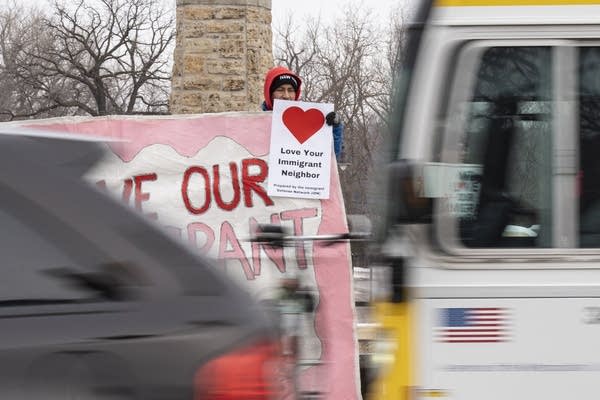
A new president
Trump’s inauguration fell on Martin Luther King Day — a school holiday. That day, the Department of Homeland Security rescinded a longstanding directive to avoid conducting immigration enforcement activities in sensitive locations like schools.
Andersen, like many Minnesota schools, held a training for teachers about how to respond if ICE attempted to visit.
When her students returned to school after the holiday, Connor gathered them and made sure all eyes were on her.
“Since the last time we had this class, we’ve had a big change in this country, right? With a new president,” she said. “In this class, we are going to talk more about what is happening in our country, because it’s important. You have the right to understand what is happening in the place where you are living.”
She told them she wanted to make sure they understood a few “superimportant things.”
“Now we are not in an era of playing with attendance,” she told them. “The place during the day where you are the most safe is inside of Andersen. Andersen cannot help you if you are in the community. We have had in the last few weeks police bring students to Andersen from the mall, from public places, from the city bus. To protect yourself and your family, you can’t play like that. You’re not untouchable.”
They also needed to make sure they had their home address and emergency phone numbers memorized, she told them. She stressed that she didn’t want to scare them, and that there was no immediate threat. But it was important to be prepared.
“You don’t need to be afraid to tell me anything related to immigration,” she told them. “As a teacher, I will never, ever, ever share your information. I will be in jail,” she said, her voice breaking, “before sharing things like that.”
She acknowledged the gravity of the conversation.
“It feels intense, right? But how many of you have been thinking about these things before this class?”
A few hands went up, including Yosi’s. Santiago stood up and went to the stationary bike placed in the back of the class for kids to work off their energy.
Connor gave them all a moment to move and stretch to shake off the heavy feelings. Then she put on a movie.
Santiago and Gordito squeezed into Connor’s big armchair. They fell asleep together.
Making preparations
In February, Yosi’s father made an appointment at the Mexican consulate so that Yosi could obtain a passport.
“I’m aware that it could be, someday, I’m leaving for work and immigration catches me,” he said. “And how are you going to get around if you don’t even have a passport?”
But, Yosi protested, she did not want to miss a day of school.
“Daughter, there are no appointments on Saturdays,” he said. “It has to be done.”
Later that month, ICE arrested five roofers in Duluth.
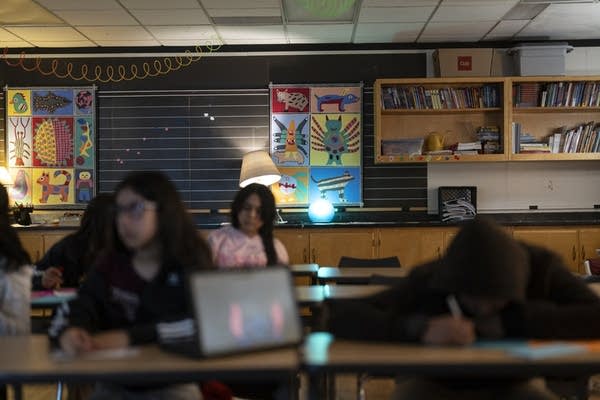
Breaking the rules?
On a scheduled national protest of a Day Without Immigrants, about a third of the school’s students stayed home. Some did it out of protest; some misunderstood and thought they needed to stay home because of immigration enforcement.
Trump signaled impatience that his mass deportation plan was not going as quickly as he’d hoped. He announced plans to drop asylum cases without a hearing — imperiling the immigration mechanism that many of Connor’s students and their families had used to arrive in the United States. He’d already suspended asylum at the southern border, so no more families could cross. And he announced plans to crack down on sanctuary cities like Minneapolis.
Fewer new students with beginner English levels were arriving at Andersen. About half as many newcomers enrolled between January 2025 and the end of the year as the same time period in 2024.
Connor’s class began a lesson on the civil rights movement. For kids new to the country, wrapping their heads around America’s racial hierarchy is a mind-bending task. Before introducing them to John Lewis and lunch counter sit-ins, she asked them to brainstorm who makes the rules.
Yosi suggested the government. Santiago said the police. Other kids offered parents, teachers, and the people.
“Are there moments in which the correct thing to do is to break the rule?” Connor asked. “And how do you know when that moment is?” She needled Santiago and Gordito — they had skipped some classes, breaking a rule. Was that the correct thing to do? No, the class agreed.
“Is it difficult or easy to come to this country legally?” Connor asked them.
“Difficult,” the class chorused.
“Is it breaking the law to arrive in this country in some ways?”
“Yes,” they said.
“Is it good to break the law?” Connor asked.
“No, but it’s a clear reason because sometimes your family is in a bad situation and the government won’t help you,” Yosi said.
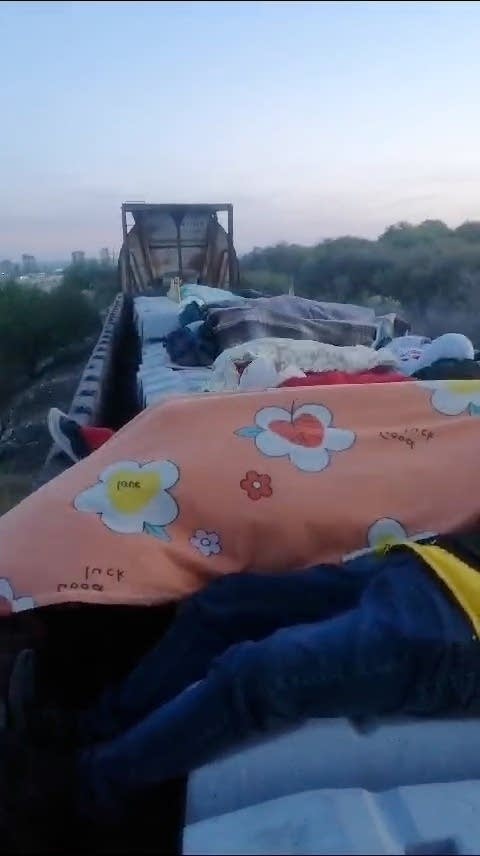
“What if there is no bad situation?” Connor asked. “What if a family just wants to follow the American dream?”
No, Yosi said. Not if they aren’t suffering in their country.
Santiago and Gordito started a thumb war.
‘I had to lie to him almost every day’
In Central America, Santiago and his father kept running into obstacles. Honduran authorities demanded proof that Santiago was his father’s son. In Guatemala, gangs demanded large sums of money to pass through the border. In Mexico, police did the same thing. Santiago’s father called relatives in Ecuador, asking for more money. They took out loans to help.
Santiago’s father paid a coyote to take them to the Mexican border. But at the end of that journey, the coyote brought them to a house where an armed cartel held them kidnapped, demanding more money they didn’t have.
After 11 days, they escaped in the middle of the night. But soon after, they were apprehended by Mexican immigration authorities and deported to Guatemala.
Now, they had to try to get into Mexico — again. They were out of money and knew they risked being turned around again. Every checkpoint brought more fear.
“Every time they stopped our bus or something, we had to have money or be sent back again,” Santiago’s father recalled. “They took me off the bus once, and they wanted to send me back alone without my son, and that’s where I felt the worst because I didn’t have the money they were asking for.”
With no money, and no prospect of borrowing more from family, they stopped for three months in Mexico City so Santiago’s father could work. He tried to keep his worries from his son.
“I had to lie to him almost every day, that everything was fine,” Santiago’s father said. “Trying to keep him from getting into that fear.”
After three months of working, Santiago’s father still did not have enough money to pay for bus tickets. So he and his son rode from Mexico City to the border atop a notorious network of freight trains known as La Bestia, or The Beast.
“It was going fast, and it was really cold,” Santiago recalled.
Sometimes people fall asleep and fall off the train, Santiago’s father said. Others remain left behind injured in the desert, unable to move forward.
They walked through the desert to connect from one train to the next. One train they rode atop for three days straight. Six perilous days later, they arrived safely in Juarez. After several failed attempts, they succeeded in crossing the border, and turned themselves into U.S. immigration authorities.
Once authorities processed them and released them, they weren’t sure what to do next. Santiago’s father called his ex-wife, Santiago’s mother. She arranged for them to come to Minneapolis.

A knock on the door
Spring arrived. Yosi was selected to attend an event at the school district headquarters honoring the academic achievement of Latino students.
And Santiago’s attendance started to improve. Suddenly, he was no longer skipping classes. His grades were improving, too.
But one day, Yosi didn’t show up for school. When she returned, Connor asked her what had happened.
“We missed you,” Connor said.
“I didn’t know how to tell you,” Yosi said.
She explained that immigration authorities had come to her family’s door early in the morning. She could see about five people out the window, wearing ID badges. They knocked, hard, “insistently,” on the downstairs door in the duplex. Then they came upstairs and knocked on her family’s door. At one point, they turned the handle of the door as though they intended to open it.
“I got worried and told my mom we shouldn’t leave,” Yosi said. Her mom wanted to open the door to see who it was and what they wanted. But Yosi said no.
“I’ve been watching the news, and I see how they take people from their homes,” she said.
“You don’t have to open the door or say anything,” Connor told her. “They need a warrant.” She used the word in English, which Connor rarely speaks with her students, and told Yosi she could ask them to show it to her under a door or through a window.
“How do you feel?” she asked Yosi.
“Unsafe,” Yosi replied.
It wasn’t the first time Connor had heard a story like that in recent weeks. The family of another student had called her in a panic recently. They’d been pulled over by police and did not understand what to do.
The police allowed Connor to act as translator over the phone. It turned out that since the car had no insurance, it could not legally be driven. Connor told them to park the car and find another way home. The parents asked Connor to drive it home for them, but she told them no: the police would be looking for them to do that.
Connor and Manuel had gotten engaged over spring break. But with so much uncertainty, they weren’t sure when they would be able to get married.
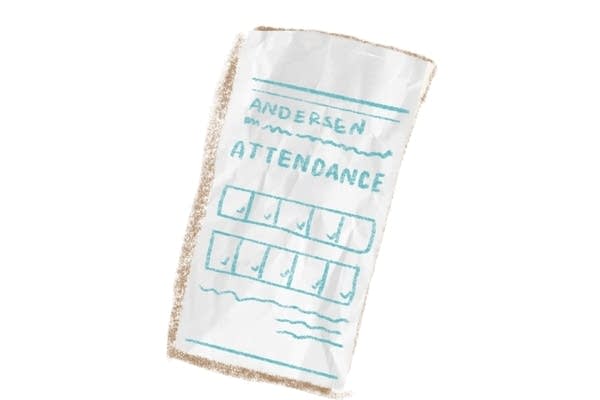
‘I changed because of her’
At the beginning of May, Santiago pulled a certificate out of his backpack and showed it to Connor. He had won an attendance award. His prize: an ice cream sandwich in the cafeteria. Through the month of April, he’d been late to classes only five times, and had only skipped three — a drastic improvement.
Connor wrapped an arm around Santiago and asked the class to applaud. Santiago grinned in pride, sticking out his tongue.
He hadn’t initially felt like he could succeed in school in America. So he skipped school with his friends.
“Before, I let my friends lead me more,” he said. “I wasn’t focused on myself, but I realized, and my dad had also given me advice, that I need studies and attendance for myself because that could help me in the future.”
He credited Connor for the change, too.
“I changed because of her, and I am really grateful to her,” he said.
Days before graduation, Santiago was suspended for an altercation with other students. Santiago said he hadn’t been involved in the fight.
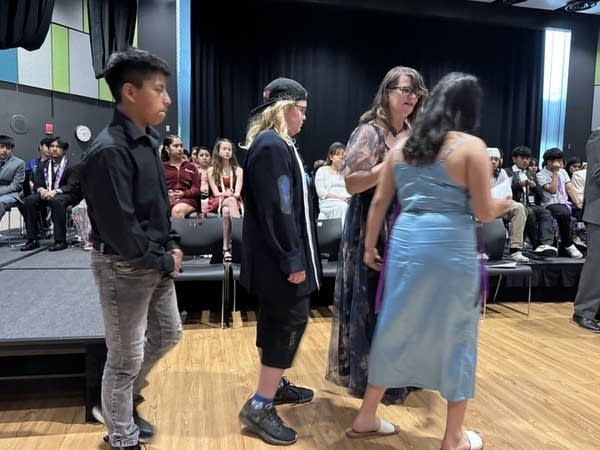
A graduation, a raid, a new beginning
Hours before the eighth-grade graduation ceremony, rumors started flying about an incident happening just a few blocks down Lake Street, in the heart of Minneapolis’ Latino community.
More than 30 law enforcement officers had converged on a popular taqueria on a busy intersection, bringing military tanks and ICE agents.
As parents’ phones lit up with the news, students took their seats in alphabetical order for their graduation. Some, including Yosi, wore ribbons designating good attendance and placement on the honor roll. She also received an award for exemplifying one of Andersen’s core values: inclusion.
Blocks down Lake Street, camouflaged officers formed a human chain around the taqueria. Some scuffled with protesters. One of the law enforcement agencies deployed a chemical irritant.
The teachers called graduates one by one to receive their certificates. Santiago puffed out his cheeks as his name was called, then walked toward his teachers to accept his certificate.
Government officials later clarified that the raid of the taqueria was not related to immigration enforcement. But in that moment, to many people in the community — including Santiago’s father — it looked like an ICE raid.
Still, for Santiago’s father, it was a day of pride. He requested the day off work for the occasion. He saw this as a step toward Santiago achieving the dream they shared: to become a professional.
Yosi’s parents and baby brother attended the ceremony, too. Yosi had thought a lot about the knock on the door her family had received earlier that spring. She had begun to question whether it was ICE, but realized she might never know.
Now she was ready for her next steps — taking classes over the summer and learning how to use her new city bus pass, a ticket to independence.
She, Santiago, and the rest of Connor’s class had completed their first school year in America. They didn’t know what would come next.




